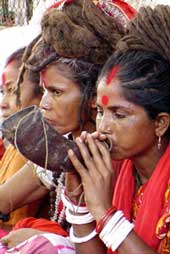Celebrating the woman
 |
The goddess and the slave (Indica, Rs 495) by Rudrani Fakir,is an “anthropological research into a secret esoteric tradition” — the Fakir cult of Bengal. Subtitled, “The fakir, the mother and maldevelopment”, the book examines the gap between the position accorded to women in Baul philosophy and the way in which they are actually treated within the cult. Baul culture has always been a favourite topic of research in the West, so much so that one feels a bit wary at the prospect of reading yet another book by a Westerner on the subject. But Fakir’s book is saved from being the usual hackneyed product by her mostly unbiased look into the ways of the life of the Bauls and Fakirs.She makes a strong case for reviving the original ideals of the tradition, which acknowledged the power of the woman as the begetter of humankind and so empowered her in significant ways. In a post-globalized world, these values are getting eroded rapidly, to the detriment of society. Fakir’s work is valuable for its juxtapositioning of the humane values enshrined in the tradition with the reality created and encountered by its practitioners. Those interested in the Fakir tradition will find a useful guide in this well-researched study.
The Second wife (Orient, Rs 175) by Prem- chand has been translated from the original Hindi by David Rubin. Premchand’s eponymous book is about the naïve and gentle Nirmala who is married off to a widower at an early age because no one else would accept her without a dowry.To the translator’s credit, he succeeds in keeping alive the flavour of the original. In the introduction, Rubin speaks about the difficulties he has encountered in translating the old-fashioned and elliptical speech of Premchand’s characters. The Hindi words are retained in places and footnotes provided, explaining the terms. Nirmala’s story of unmerited suffering has been liked by Indian readers for generations. Rubin’s excellent translation will allow the Western audience to appreciate the subtle nuances of Premchand’s timeless narrative.
Cultural history of modern india (Foundation, Rs 195) Edited by Dilip M. Menon is a collection of six essays which examine popular culture, oral history, gender studies, films, cricket and Indian classical music in the context of modern India. The essays bring out the way in which ideas of the self, community and art have become politicized in recent times. Even the domain of the cultural remains barely insulated as political concerns inform it.The essay, “A book of her own, a life of her own” by Tanika Sarkar is a particularly interesting study of Amar Jiban, the first autobiography written by a Bengali woman, Rashsundari Debi. Sarkar shows how a woman like Rashsundari creates her emotional and intellectual space through her interactions with the bhakti tradition.It was Rashsundari’s irrepressible urge to read the Chaitanya Bhagavat that triggered off her struggle to master the letters.
 |
The magic drum and other favourite stories (Puffin, Rs 150) by Sudha Murty is a collection of folktales from all over the world. But the stories acquire Indian settings in the author’s retelling. The tales are very much in the line of those to be found in the Jataka or the Panchatantra, though, perceptively enough, Murthy leaves out the tales which have “gods and goddesses and supernatural beings solving problems”. This helps to emphasize the ingenuity of ordinary men and women in solving the problems they find themselves in. If the tales in the book educate, they do so entertainingly.











